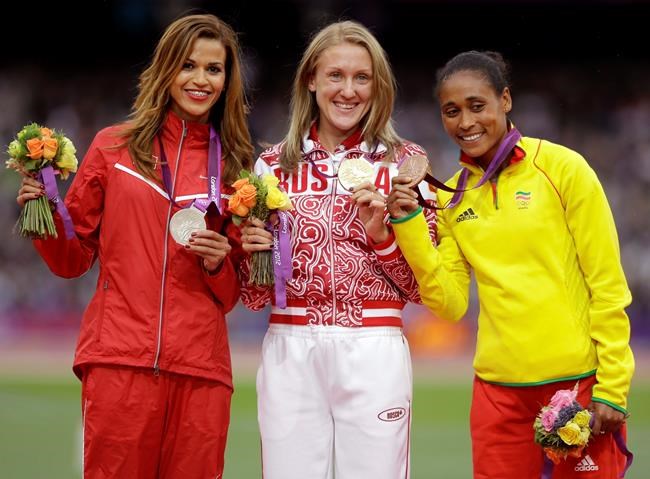Elevate your local knowledge
Sign up for the iNFOnews newsletter today!

LAUSANNE, Switzerland – Yulia Zaripova, the Russian gold medallist in the women’s 3,000-meter steeplechase at the 2012 London Olympics, was among 12 more athletes sanctioned Monday after testing positive in a reanalysis of their doping samples.
Zaripova was among seven medallists — all from countries of the former Soviet Union — disqualified retroactively from the London Games after their stored samples were retested with improved techniques and came back positive for banned substances.
Also sanctioned Monday by the International Olympic Committee were nine weightlifters, a hammer thrower and a long jumper.
Zaripova tested positive for the steroid turinabol on a urine sample she provided after winning the steeplechase final on Aug. 6, 2012, the IOC said.
Zaripova was already expected to lose the gold medal over a separate doping violation prosecuted by the IAAF. She had previously served a 2 1/2-year ban for irregularities in her biological passport. As a result of that violation, the Court of Arbitration for Sport had disqualified all of her results from July 2011 to July 2013, including the London Olympics.
A three-person IOC disciplinary commission said in its ruling that a decision in Zaripova’s case “has already been issued and has become final and binding” and “there is no longer any interest to continue the present proceedings and to issue a decision.”
The panel recommended that the IOC implement the IAAF decision to amend the Olympic results and strip Zaripova of the gold medal. Under the revised results, Habiba Ghribi of Tunisia takes the gold, with Sofia Assefa of Ethiopia moving to silver and Milcah Chemos Cheywa of Kenya the bronze.
Other athletes stripped of London medals on Monday were: Alexander Ivanov, Russia, silver, men’s 94-kilogram weightlifting division; Natliya Zabolotnaya, Russia, silver, women’s 75kg weightlifting; Cristina Iovu, Moldova, bronze, women’s 53kg weightlifting; Hripsime Khurshudyan, Armenia, bronze, women’s 75kg weightlifting; Irina Kulesha, Belarus, bronze, women’s 75kg weightlifting; and Anatoli Ciricu, Moldova, bronze, men’s 94kg weightlifting.
The non-medallists were Andrei Demanov, Russia, fourth place, men’s 94kg weightlifting; Oleksandr Dryhol, Ukraine, 34th place, men’s hammer throw; Rauli Tsirekidze, Georgia, ninth place, 85kg weightlifting; Margaryta Tverdokhlib, Ukraine, 26th place, women’s long jump; and Almas Uteshov, Kazakhstan, seventh place, men’s 94kg weightlifting.
The IOC reanalyzed more than 1,000 stored samples from the London Games and 2008 Beijing Games in order to catch cheats who escaped detection at the time. The new tests can detect the use of steroids going back weeks and months, rather than days.
The IOC recorded at least 98 positive tests from the London and Beijing retesting program, with more expected in the pipeline. The IOC also plans to retest samples from the 2014 Sochi Winter Games after the former Russian lab director said samples were manipulated to cover up doping by Russian athletes.
Want to share your thoughts, add context, or connect with others in your community?
You must be logged in to post a comment.